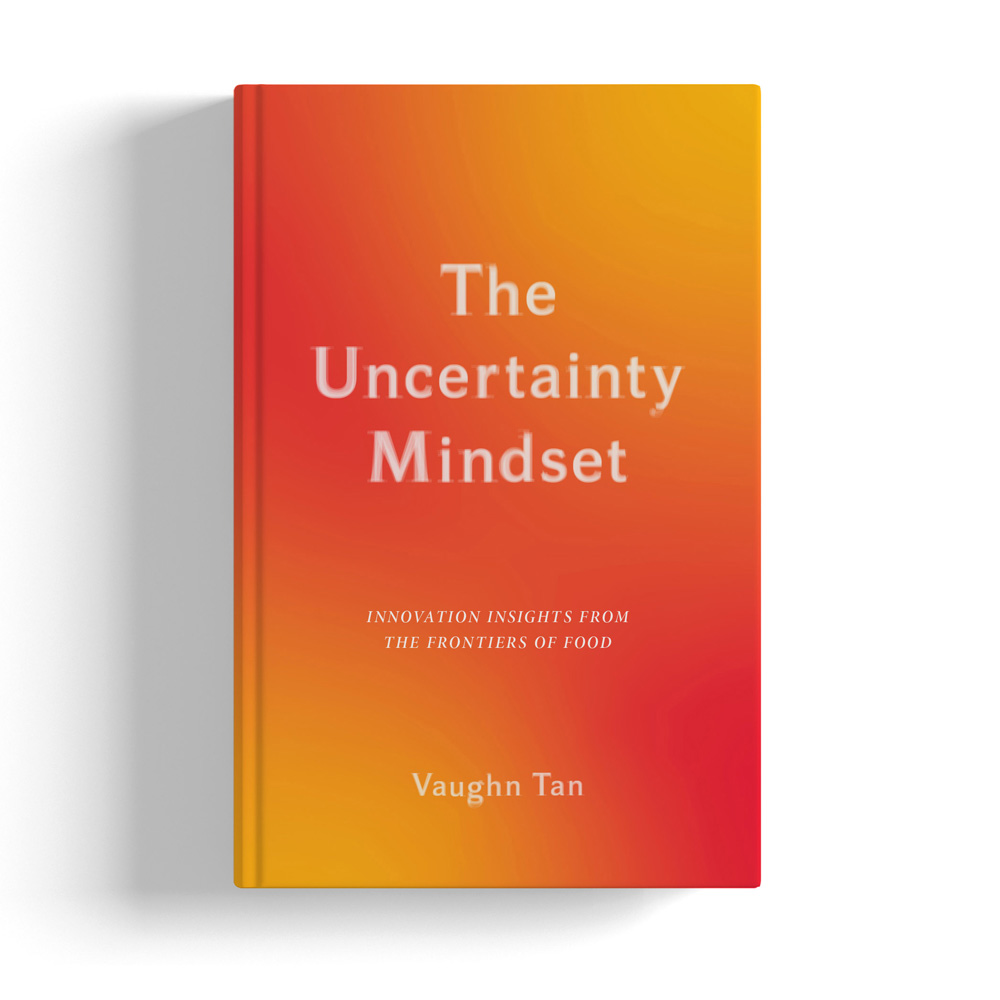“Full of valuable insights for forward-thinking organizations and teams in any sector.”
Nathan Myhrvold

“a new, more subtle way of thinking about hiring, managing, and trusting innovators”
Jerry Neumann
“Full of valuable insights for forward-thinking organizations and teams in any sector.”
Nathan Myhrvold

“a new, more subtle way of thinking about hiring, managing, and trusting innovators”
Jerry Neumann
Actually, this book is for anyone who’s getting worried that the world is not just risky but actually truly uncertain, and wants to understand how to survive and thrive in our increasingly and unavoidably uncertain future.
- You get excited about shows like Mind of A Chef or Chef’s Table — and want to go deeper into the world of high-end cuisine and particularly the labs where new ideas in food are transformed into reality.
- You love restaurant culture and are captivated by food that feels brand new and unfamiliar — and want to understand how teams of people in restaurants come up with different kinds of Brand New Food.
- You think it’s weird that high-end cuisine suddenly got obsessed with continual innovation after hundreds of years of treating it as an afterthought — and want to understand the counterintuitive undercurrents that combined to create this movement.
- You wonder why conventional hiring processes create boring organizations with employees who can’t adapt to changing conditions — and want to understand how to hire more adaptable, innovative, engaged employees.
- You wonder why conventional goal-setting exercises are so pointless — and want to understand how to set goals so that teams become more effective, adaptable, and innovative.
- You wonder why conventional ways of motivating employees fail to keep them from resting on their laurels — and want to learn how to design organizations which are continually hungry to learn and do new things.
How can people and businesses become more innovative and more adaptable in highly uncertain situations? In The Uncertainty Mindset, I provide an answer based on years of unprecedented access to some of the most influential culinary R&D teams in the world, including The Fat Duck Experimental Kitchen, ThinkFoodTank, and The Cooking Lab (creators of Modernist Cuisine and Modernist Bread).
These teams exemplify the uncertainty mindset. Such a mindset intentionally incorporates uncertainty into organization design, rather than simply trying to reduce risk. It changes how organizations hire, set goals, and motivate team members and leads organizations to work in highly unconventional ways.
This book explains how the uncertainty mindset makes these cutting-edge culinary teams better at adapting to change and coming up with good problems to solve—and offer people and businesses in other sectors these innovation insights from the frontiers of food.
Read the book's preface here.
Vaughn Tan is an assistant professor of strategy and entrepreneurship and one of the founding faculty at University College London’s School of Management. He previously worked for Google in California. His personal website is here. You can also find him on Twitter and Instagram.
“This is one of the best books to appear in the last several decades about how to design organizations for continual innovation in high-pressure environments. It offers explanations for why some companies work and others don’t, and made me embrace a new, more subtle way of thinking about hiring, managing, and trusting innovators in leading-edge technology companies.”
Jerry Neumann; founder of Neu Venture Capital.
"Vaughn’s book is the most insightful treatment I’ve read of industrial R&D organizational practices―and now I’m hungry for more."
Andy Matuschak
"A fascinating account of how top chefs and their teams approach innovation."
Welcome to the Jungle
“The Uncertainty Mindset takes a close look at the secret inner workings of some of the most innovative food R&D teams worldwide. It shows organizations in other industries how to redesign themselves to become more resilient, innovative, and adaptable—by simply changing how they think about the future.”
Amy C. Edmondson; Harvard Business School; author of The Fearless Organization.
"If you’re an R&D executive or practitioner, The Uncertainty Mindset is a worthy if occasionally repetitive (in the time-honored academic style) read that should spark ideas for improvement. And if, in this pandemic year, you are missing high-end cuisine, you will surely find it an appetizing read as well."
Strategy + Business
"In this closely researched book, the emphasis is on culinary innovation."
Times Literary Supplement
“Vaughn Tan spent long periods observing some of the world’s most famous chefs at work in their prize-winning restaurants and tells his readers what they do and how they do it. A real contribution to our understanding of how experts combine artistic creation and business success.”
Howard S. Becker; author of Art Worlds.
“Vaughn Tan has written a fascinating, well-researched account of how some of the world’s top chefs and their teams approach culinary innovation. This book is full of valuable insights for forward-thinking, innovation-minded organizations and teams in any sector.”
Nathan Myhrvold, coauthor of Modernist Bread, Modernist Cuisine, and Modernist Cuisine at Home, author of The Photography of Modernist Cuisine.
“Chefs are responsible for some of today’s most novel innovations. Vaughn Tan goes behind the scenes to show how R&D is organized inside the world’s most famous kitchens, uncovering surprising lessons that have wide application. This is a provocative contribution to studies of culture and R&D.”
Walter W. Powell; Stanford University.
And finally:
“I expected this book to be about food and its future in today's world. It was more about management and creating a modern, resourceful, restaurant kitchen that will succeed in today's world. If you are going to run to are running [sic] a commercial kitchen this is the book for you - if you are interested in the future of food, it is not. As a librarian, if I do not learn something new or get engaged in the book, I am admitting thatI [sic] did not truly read/finish the book (I skimmed through it) as there are too many good ones out there to read and review.”
Janet; Goodreads librarian.